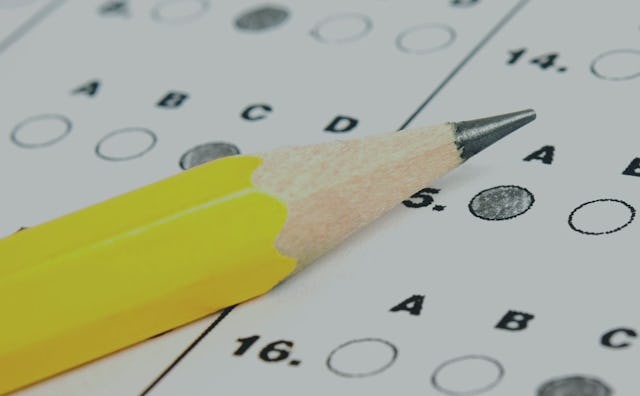Why Don't We Just Get Rid Of The SAT Once And For All?

George Washington University joined more than 800 other four-year colleges and universities last week and eliminated the standardized test as a requirement for freshman admission. The rationale? Not every high-achieving student tests well, and GWU admissions officers are concerned that an emphasis on test scores keeps otherwise excellent candidates—many of them minority and low-income students—from applying. Both proponents and critics of standardized testing are observing George Washington’s move with interest, as it’s one of the largest and most exclusive schools to drop the testing requirement.
Even if you think we need a consistent yardstick by which to compare students, it’s not a stretch to say that the standardized testing business is a racket, a rigged system that favors wealthy students who can afford expensive test prep courses and private tutors (some charging up to $600 an hour). And while there are indeed students who legitimately require extra time to complete the test, it is possible for privileged families to pay psychologists for dubious diagnoses of learning disabilities in order to get extra time to take the SAT.
As far back as 1999, John Katzman, founder of The Princeton Review, told PBS’s Frontline that the SAT is basically bullshit:
The SAT is a scam. It has been around for 50 years. It has never measured anything. And it continues to measure nothing. And the whole game is that everybody who does well on it, is so delighted by their good fortune that they don’t want to attack it. And they are the people in charge. Because of course, the way you get to be in charge is by having high test scores. So it’s this terrific kind of rolling scam that every so often, somebody sort of looks and says—well, you know, does it measure intelligence? No. Does it predict college grades? No. Does it tell you how much you learned in high school? No. Does it predict life happiness or life success in any measure? No. It’s measuring nothing. It is a test of very basic math and very basic reading skill. Nothing that a high school kid should be taking.
A study obtained by NPR found that test scores are not an accurate predictor of how students will perform in college—but their high school grades are. “Students with good grades and modest testing did better in college than students with higher testing and lower high school grades,” says William Hiss, former Dean of Admissions for Bates College, a school that does not require standardized testing.
A high GPA demonstrates “[f]our-year, long-term evidence of self-discipline, intellectual curiosity and hard work,” which is a far richer indicator of the actual abilities of a student than is how they perform on a single test taken early on a Saturday morning. Yet beyond grades, there are other talents and characteristics colleges should be looking at much more closely when evaluating students. A student who’s participated actively in sports or the arts, who’s described in recommendations as hardworking or intellectually curious or a leader in class discussions, could be just as likely to excel once she gets to college as the one with superior grades. Sure, colleges have always considered extracurricular activities and teacher recommendations when making admissions decisions—we all know that that high-school track star will always be able to name her school.
But a more nuanced look at the actual personality and character of students would likely yield a freshman class more diverse but equally poised for success. Why not decrease the emphasis on admitting “superstars” and look more carefully at “regular” kids with sustained and active interest in extracurricular pursuits? Why not specifically search out candidates with high “Emotional Intelligence,” which measures people’s ability to use emotions to understand themselves and others, and is linked to strong job performance and leadership skills? College admissions places so much emphasis on tests of dubious efficacy and on grades that measure one kind of intelligence that’s rigid and confining, while the measure of the human being is a far more complicated and idiosyncratic rubric.
Eliminating the standardized test requirement is a massive step in the right direction. Let’s hope more schools follow in George Washington University’s footsteps and do the same. But let’s also hope schools will take the evidence of standardized testing’s deficiencies as an opportunity to look more closely at all students, to see them as living, breathing human beings who are fascinating and flawed and exciting and diverse. College is a place where we hope kids will learn how to survive and conduct themselves in the real world. The more college populations reflect that world, the better.
This article was originally published on